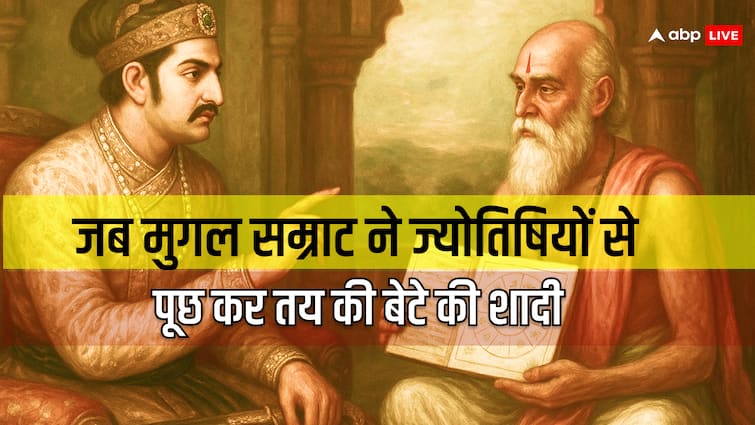Can a Muslim emperor ask Hindu pundits to ask for marriage? It may seem strange to hear, but the truth is that a Mughal ruler also happened in history, who had unwavering faith in Indian astrology and he was the emperor ‘Akbar the Great’.
Akbar not only made the horoscope of his son Salim (Jahangir) from seven astrologers, but the date of marriage was also decided by seeing the Hindu calendar. How Akbar crossed the walls of religion and gave direction to politics through the movement of ‘planets’, and why this episode is relevant in today’s world. Know-
When the Mughal emperor asked astrologers and decided the auspicious time of marriage
In today’s modern era, some people may feel this imagination, but not. This is the amazing truth of history, when Mughal Emperor Akbar consulted Hindu astrologers for the wedding of his son Salim. A Mughal ruler was not just religious tolerance, but a proof of reverence for knowledge.
Akbar’s ‘Ibadatkhana’ shows what his thinking?
Historian Vincent Smith writes in his book ‘Akbar: The Great Mogul’ that Akbar (1542–1605) was more than a winner, a secular thinking emperor.
Akbar established ‘Ibadatkhana’ in Fatehpur Sikri, where he used to discuss deeds with Hindu, Jain, Muslim and Christian scholars. In one place he writes ‘It was common for akbar to ask Hindu astrologers and jain scholars to interpret celebial events.’ That is, discussion with astrologer and scholars, analysis of planetary transit was a part of daily life for Akbar.
Jahangir’s horoscope was made by seven astrologers
Wheeler M. Thackston who translated many books, translating Jhangirnama, writes that when Salim was born, Akbar invited seven astrologers to make his horoscope i.e. horoscope. Some of these were experts in Hindu calendar and some Greek astronomy.
Tuzuk-e-Jahangiri (Jahangiranama) is the autobiography of Mughal Emperor Jahangir. It is written in Persian. This autobiography is also considered a unique example of literature. Translating it into English, wheeler M. Thackston writes- ‘When I was born, astrolowed, both hindu and muslim cast my horoscope …’ Jahangir writes that when I was born, both Hindus and Muslim astrologers made my horoscope.
Marriage was removed from Hindu calendar
The auspicious day of Jahangir’s marriage was also decided on the basis of the calculation of these Hindu astrologers. This is an example of Akbar’s belief that time in state works should be selected according to the planets.
Indian historian Satish Chandra writes in his book Medieval India: From Sultanat to the Mughals that ‘He Considered Planetary Positions and Consulted Brahmin Astrologers before Royal Weddings.’ That is, the Mughal emperors used to consider the position of the planets before the royal weddings and consulted the Brahmin astrologers.
What was Akbar’s faith in astrology only tradition or trust in science?
It also has to be understood that why the Mughal Emperor Akbar believed so much in astrology. There are also examples that Akbar did not ignore astronomical events like solar eclipse, lunar eclipse, constellation change.
Science also believes these things. In Akbar’s court, scholars like Pandit Jagannath, Birbal had authority over astrology and scriptures. H. Blochmann who translated the mirror Akbari (Ain-I-Cabari), he writes ‘Akbar Respected the Learning of the Brahmins and often Consulted them in Astrological matters.’ That is, ‘Akbar respected the education of Brahmins and often consulted them in astrological matters’.
Did Akbar implement the instructions of Indian astrological texts?
The importance of Muhurta is explained in detail in Vedic scriptures. The tradition of watching Muhurta is not limited to work like marriage. It is clearly written in Brihajjatakam or large native composed by Varahamihira-
Nakshatranan Ch Sarveshan Muhurta Pashyatam Shubham.
Rajya Vivan Yajnay Ch Prashanthanam Dress॥
(That is, it is necessary for the state, marriage and sacrifice to remove auspicious time on the basis of planets and constellations.) Even today this Sanatan tradition is being followed. Which was also relevant even during Akbar’s time.
Is the relationship of knowledge above religion?
It is a symbol of India’s religious diversity and tolerance. This shows that the relationship between power and knowledge is above religion. This proof seems amazing in today’s interfath dialogue and mixed marriages.
This step of Akbar is a proof that a true ruler is the one who understands the knowledge, time and the movement of the planets. Where the boundaries of religion end, Rajdharma and Vivek begin from there, this was proved by Akbar.

